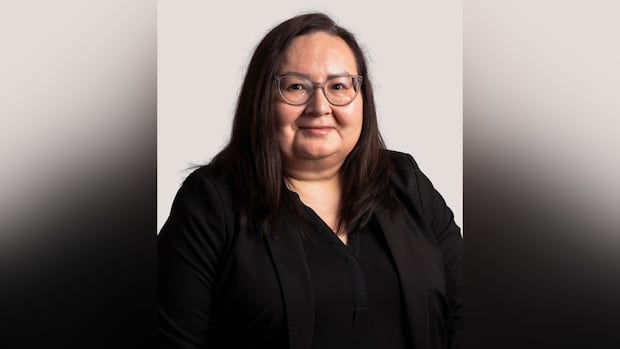ManitobaStacey Soldier is the first Anishinaabe woman to lead the Manitoba Bar Association — a milestone she says is grounded in a powerful memory from her 17 years of work with children and victims of sexual assault.’A win for all of us Indigenous lawyers,’ U of M professor says about Stacey Soldier’s new roleStacey Soldier is the new president of the Manitoba Bar Association. The Swan Lake First Nation lawyer is the first Anishinaabe woman in the position. (Submitted by Stacey Soldier)Stacey Soldier is the first Anishinaabe woman to lead the Manitoba Bar Association — a milestone she says is grounded in a powerful memory from her 17 years of work with children and victims of sexual assault.Fresh out of the University of Manitoba after graduating in 2007, Soldier met a 13-year-old girl and her guardian for what had become a routine debrief to prepare her clients for court.The girl stared blankly at her before asking for permission to ask a question.”She said … ‘Are you a Native lady?’ like, just so full of doubt but wanting to know the answer,” Soldier said. “I said ‘Oh, yeah,’ and she kind of sat back and said ‘I didn’t know Native ladies were allowed to be lawyers.'” That moment crystallized a lesson former senator, judge and lawyer Murray Sinclair had taught her in class, she said, but also spoke to the importance of the representation in the court system. LISTEN | Anishinaabe lawyer makes history: Information Radio – MBSouthern Manitoba lawyer makes historyStacey Soldier, a lawyer from Swan Lake First Nation, tells host Marcy Markusa how it feels to be the first Indigeous woman to serve as the president of the Manitoba Bar Association and why Indigenous representation in law is so important.”My presence is going to be meaningful for clients who come to the court and are afraid and are unsure, because it’s such a foreign system to many Indigenous people in this province,” Soldier said.”I did work really hard to be here and I am very excited for this opportunity to represent my profession.” Soldier succeeds lawyer Jessica Schofield for the 2025-26 term at the organization responsible for representing lawyers, notaries, judges, academics and law students in the province. The Manitoba Bar Association said Soldier will become the first Anishinaabe woman to hold the role.The Swan Lake First Nation lawyer was called to the bar in 2008.In addition to her legal practice in criminal law, she has served as a prosecutor and co-counsel the Assembly of Manitoba Chiefs at the National Inquiry on Missing and Murdered Indigenous Women and Girls. She also mentors law students at the University of Manitoba’s Robson Hall, where she offers teaching on criminal justice, family law and Indigeneity.Soldier has also been a mentor to many First Nation law students in Manitoba, including Red River Métis lawyer Melinda Moch. “Stacey is the person who opened arms [and] embraces every single law student who comes through the doors,” Moch said.”She’ll just look you dead in the eyes and say if you have any questions, if you have any problems, if you just need to vent, you come to me.”Moch said Soldier’s experience has given her the perspectives into equity and reconciliation needed to spark change.Her appointment, paired with Michelle O’Bonsawin’s induction as Canada’s first Indigenous Supreme Court justice, also brings positive representation of Indigenous people into the justice system — something Moch said she struggled to see growing up. Melinda Moch, a Red River Métis lawyer in Winnipeg, says the appointment of Soldier as president of the Manitoba Bar Association is important for the positive representation of Indigenous people in the justice system. (Submitted by Melinda Moch)The overrepresentation of Indigenous people in the criminal system, with them making up to 30 per cent of admissions to provincial and territorial correctional services, according to Statistics Canada, has had a negative influence on how Indigenous people have been seen in society, Moch said. “You feel that hurt and that pain on a daily basis, but you don’t know how to fix it. You just wait … and then something like this happens and you see hope in the future,” she said. “Just by virtue of her existing in that space, we have a positive growth opportunity here.” Marc Kruse, the director of Indigenous legal learning and services at the University of Manitoba, says Soldier has been at the forefront of incorporating Indigenous legal orders and protocols into the curriculum of the law program. (Amar Khoday/University of Manitoba)That representation is important as the largest cohort of Indigenous students graduates from Robson Hall and enters the workforce, said Marc Kruse, director of Indigenous legal learning and services at the University of Manitoba.”Often there was a pressure … to hide your Indigenous identity, because you weren’t welcome. It wasn’t a safe space, and Stacey pushed down through some of those barriers,” he said. But over the past decade, Soldier has been at the forefront of bringing Indigenous legal orders and protocols that were not taught before into the classroom, Kruse said.He sees Soldier’s new role as an opportunity to integrate those teachings into the legal system in the province as she works with all levels of court.”She can be an advocate at a much higher stage,” he said. “Just having a strong First Nation woman in those spaces itself is a win for all of us Indigenous lawyers.” ABOUT THE AUTHORSantiago Arias Orozco is a journalist with CBC Manitoba currently based in Winnipeg. He previously worked for CBC Toronto and the Toronto Star. You can reach him at santiago.arias.orozco@cbc.ca.
Thursday, 5 Feb 2026
Canada – The Illusion
Search
Have an existing account?
Sign In
© 2022 Foxiz News Network. Ruby Design Company. All Rights Reserved.
You May also Like
- More News:
- history
- Standing Bear Network
- John Gonzalez
- ᐊᔭᐦᑊ ayahp — It happened
- Creation
- Beneath the Water
- Olympic gold medal
- Jim Thorpe
- type O blood
- the bringer of life
- Raven
- Wás’agi
- NoiseCat
- 'Sugarcane'
- The rivers still sing
- ᑲᓂᐸᐏᐟ ᒪᐢᑿ
- ᐅᑳᐤ okâw — We remember
- ᐊᓂᓈᐯᐃᐧᐣ aninâpêwin — Truth
- This is what it means to be human.
- Nokoma











